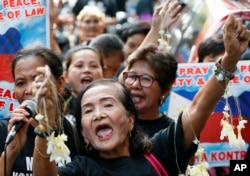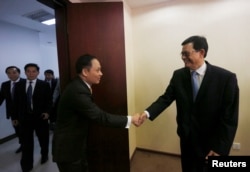Hanoi has officially reacted to Phnom Penh’s request to “identify” and “take strong action against” Vietnamese nationals who purportedly left insulting comments on Cambodian Premier Hun Sen’s Facebook page, criticizing him for supporting Beijing’s claims over the South China Sea.
In a written statement, Le Hai Binh, spokesman for the Vietnam Ministry of Foreign Affairs, said the personal opinions apparently posted by Vietnamese writers “do not reflect Vietnam’s stance.”
“We ... do not support those who used freedom of speech to make personal insults and provocative attitude in order to drive a wedge between the peoples of the two countries,” the spokesperson said.
Last week, the Cambodian government condemned the “verbal attacks” accusing Hun Sen of betraying his eastern neighbor as “immoral” and “highly offensive.”
Huynh Ngoc Chenh, a Vietnamese media expert, said he was surprised by Vietnam’s response.
“It shows the increased impact of social media — Facebook in particular — on the ruling authorities, especially the Vietnamese ones,” said Chenh, adding that even Vietnamese Premier Nguyen Xuan Phuc was recently forced to publicly apologize after his motorcade swept through narrow Hoi An streets reserved for pedestrians, resulting in widespread rounds of condemnation on Facebook.
Premier's response
The Cambodian premier on Monday took to the social network to hit back at his South China Sea detractors, calling on Vietnam to respect Cambodian sovereignty and "[educate] their people not to bother me anymore."
"Again, I want to reaffirm with you that I am not a Vietnamese puppet serving the benefits of Vietnamese country, and I’m also not a boss of Vietnam," the Cambodian leader posted. "I’m not asking Vietnam to serve Cambodian political interest either. The South China Sea conflict should [be resolved] ... peacefully by the Chinese and Vietnamese governments. It’s better than [resolving] it through war, as you’ve mentioned in your comment on my Facebook.”
Ou Virak, founder of the Phnom Penh-based Future Forum think tank, told VOA's Khmer service that although he agreed the criticism of his premier didn't reflect the stance of Vietnamese officials, he questioned Hun Sen's political prudence in personally responding to the slights of random internet users, let alone in the manner of a formal diplomatic statement.
"I believe there are people who build the premier's Facebook page," he said. "If he does not like how people comment [on his posts], he can just ignore them."
Vietnamese spokesperson Binh told VOA's Vietnamese service that the foreign ministry attaches importance to “friendly, neighborly and comprehensive relations with Cambodia,” and that it has "made efforts to maintain these ties for the common interests of two peoples.”
Border dispute
On Tuesday, Vietnam and Cambodia concluded closed-door discussions on a territorial border dispute, jointly agreeing to "seek international consultants to advise on ways to demarcate the border.”
Var Kim Hong, leader of the Cambodian delegation, told reporters that the two sides “failed to reach an accord.”
Tran Cong Truc, a former Vietnamese official in charge of border affairs who has repeatedly engaged with Cambodian counterparts, struck a slightly more optimistic tone.
"Vietnam has shown its willingness to solve the border issue by agreeing to have a third party, especially France, joining in the demarcating process," he said, adding that France prepared the original map delineating the shared border during the colonial era.
The head of the Cambodian delegation, however, said Phnom Penh observes the border with Vietnam as it was set in 1983, according to maps of Indochina — the former French colonial territory that now comprises Vietnam, Cambodia and Laos.
Tensions have mounted in recent weeks as Phnom Penh has accused Hanoi of illegally digging ponds and building outposts inside Cambodian territory — assertions that Vietnam denies.
This report was produced in collaboration with VOA's Vietnamese and Khmer services. VOA's Ith Sothoeuth and Hul Reaksmey contributed reporting from Phnom Penh.
Correction: An earlier draft of this story indicated that Malaysia, Thailand and Myanmar were once part of French Indochina. The territory of the former colony is in fact the present states of Vietnam, Cambodia and Laos only. VOA regrets the error.









